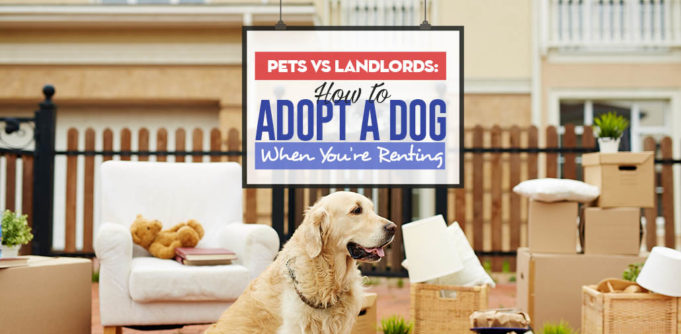If you're a renter and are now thinking about adopting a dog, one of the first obstacles you will come upon is dealing with your landlord. Unless the place you’re renting contractually allows pets or you have your own home, adopting a dog can be problematic in that way. This is an important thing to consider and it is best to find the solution before you get the dog.
Hide Your Dog?
Renting a place with a “no pets” policy can drive you to hide your new dog from your landlord, but that is a bad idea. Sooner or later the truth is bound to be revealed and you can either be evicted, ruin your renter score, and/or pay a large fine.
Hiding your dog is stressful, both for you and your dog. You will feel the constant need to shush your pooch and won’t be able to relax in your own home. Dogs are outgoing creatures and making them stay inside and hide is not fair to them. They need walks and bathroom breaks, which is hard to accomplish if you have to hide your Fido from your landlord and probably your neighbors.
Of course, hiding a dog from a landlord is not impossible, especially if you are thinking about getting a small dog. As few Reddit users suggested here, often the “no pets” sign actually means “no large dogs”. Small dog breeds or cats can often go unnoticed and even if you get caught, your landlord is less likely to take drastic measures like evicting you.
However, I would strongly advise against this course of action; it is better to be open with your landlord beforehand and see if you can change his mind about dogs, get some kind of a deal, or possibly start looking for a new place that allows dogs.
Pitching a Dog to Your Landlord
Talking with your landlord could be the best and simplest solution. Your landlord can be open to some dog breeds even if he has a “no pet” policy or he might be fine with a dog if other tenants don’t have a problem with having the animal around. And if he is reluctant to the idea, “persuade him otherwise”.
ALSO READ: 20 Home Renovation Tips for Dog Owners [Infographic]
Talk About the Benefits
 Renting can be stressful, so most landlords strive to have long-term tenants since they don’t have to do as much management work with them and they don’t lose any money as they do when they look for new tenants.
Renting can be stressful, so most landlords strive to have long-term tenants since they don’t have to do as much management work with them and they don’t lose any money as they do when they look for new tenants.
Considering that there are fewer places you can rent as a dog owner, that means that dog owners tend to stay longer when they find a pet-friendly rental, usually for multiple years. Mention this to your landlord and commit to a longer lease if he allows you to have a dog.
Offer to pay a larger deposit (or pet deposit) or additional rent that will cover wear and tear that can happen when you have a dog. Additional deposit of around 25% extra is usually reasonable for having a pet and can tip the scale in your favor.
If you have made up your mind to adopt a dog as a renter and won’t be deterred from it, say that you will leave if the landlord refuses your request and remind him of the tedious process of showing the property to potential tenants and helping them move in. Before all of this, make sure that you actually are a good and responsible tenant that a landlord would hate to lose.
Keep Landlord's Point of View in Mind
Many landlords were open to pets in the first place, but experiences like this one made them more cautious. Thinking like a landlord can help you dismiss his concerns and persuade him that he has no reason to worry about you having a dog around.
Demonstrate that you understand how your landlord feels. Ensure that you clean after your dog and that your pooch will not disturb the other tenants. Tell the landlord that you will train your pet to be quiet and not to destroy the property and offer to let him meet your pooch once he is properly trained. You can discuss the breed with the landlord and find a common ground, like getting a smaller breed since they are easier to handle and their bark is not as loud. Also, some landlords believe that smaller dogs cause less wear and tear.
Propose a written agreement to guarantee that your dog will not be a disturbance in any sense and ensure the safety of other tenants. Let him include conditions that he thinks are necessary. Offer to get renter’s insurance that also covers liability related to your dog.
Know Your Rights
 There are ways to get a dog into a place you are renting even without your landlord’s approval due to a few exceptions under the Fair Housing Act. This is a federal law that prevents discrimination against tenants.
There are ways to get a dog into a place you are renting even without your landlord’s approval due to a few exceptions under the Fair Housing Act. This is a federal law that prevents discrimination against tenants.
The FHA means that people with disabilities who require the help of an animal, such as a service or an emotional support dog, are allowed to keep it even if the landlord’s pet policies don’t allow it, without having to pay any pet-related fees. You must provide a letter to your landlord from your mental health provider or physician to prove your claim for an emotional support or service animal.
There is another law that you can take advantage of, particularly if your landlord doesn’t visit often and you believe your neighbors will not “turn you in”. The notorious “three-month law” (PDF) says that “once a companion animal lives in a multiple dwelling for three or more months, openly (not hidden from the building’s owners, their agents, and on-site employees), then any no-companion animal clause in a lease is considered waived and unenforceable”. Keep in mind that this a New York City law, but you can ask or search online if the area you live in has a similar law.
READ NEXT: 27 Questions to Ask Yourself to Know If You’re Ready for a Dog













